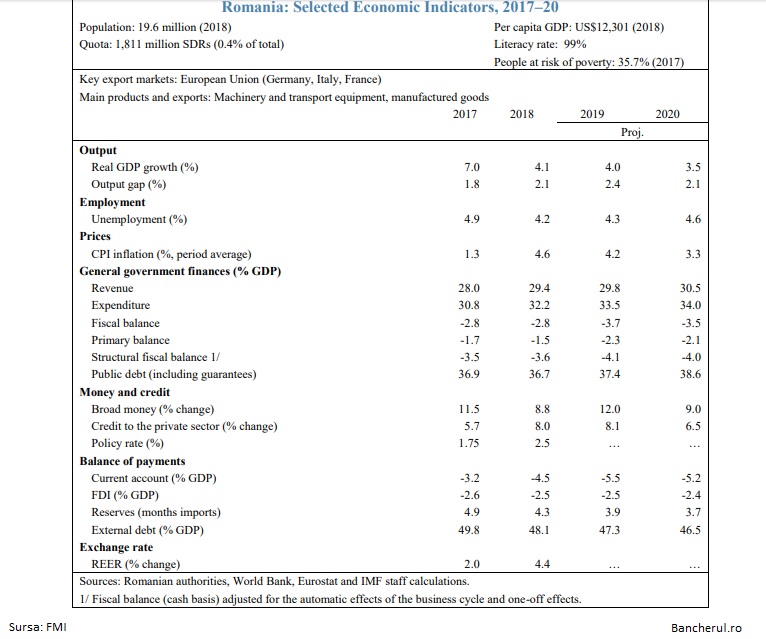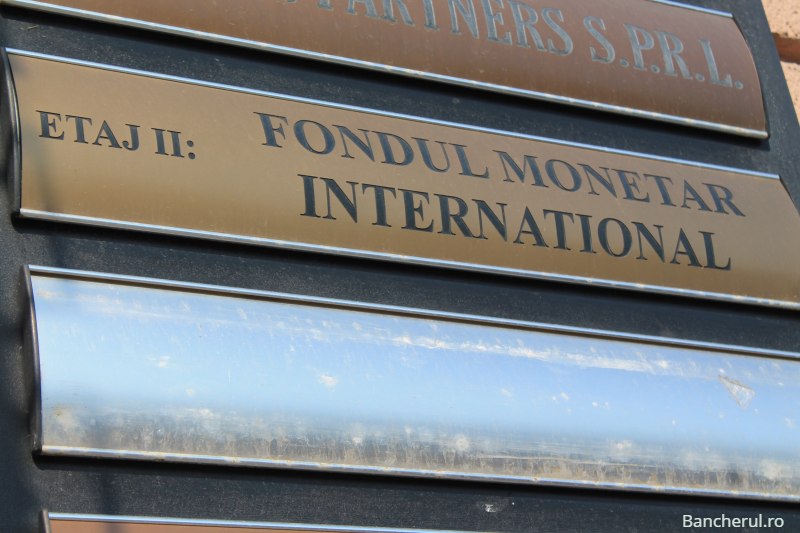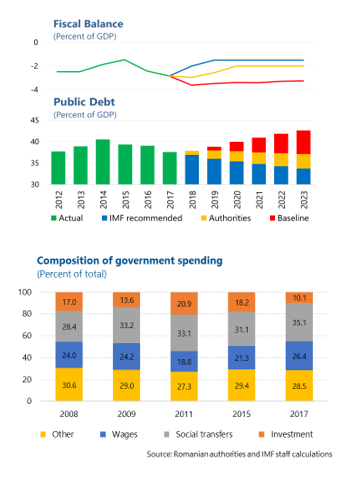FMI cere BNR sa intareasca politica monetara iar Guvernului sa modifice legea pensiilor

Fondul Monetar International (FMI) cere Bancii Nationale a Romaniei (BNR) sa intareasca politica monetara, pentru a struni inflatia in crestere, iar Guvernului sa modifice legea pensiilor, care ar putea submina stabilitatea fiscala.
“Noua lege a pensiilor ar putea submina stabilitatea fiscala, de aceea ar trebui sa fie revizuita complet, pentru a echilibra nevoile sociale, echitatea si investitiile, conform spatiului fiscal disponibil”, se spune intr-un comunicat al FMI (vezi comunicatul mai jos).
FMI prognozeaza un deficit bugetar de 3,7% in acest an, peste limita de 3% stabilita de normele europene, in timp ce inflatia ar urma sa urce la 4,2%, fata de tinta maxima a BNR, de 3,5%.
IMF Executive Board Concludes Article IV Consultation with Romania
August 30, 2019
On August 28, 2019 the Executive Board of the International Monetary Fund (IMF) concluded the Article IV consultation [1] with Romania.
Economic growth in Romania was strong in 2018, reflecting pro-cyclical fiscal policy and rapid wage increases. Unemployment reached record lows and financial sector is stable. Fiscal and current account deficits have been widening in the past few years, reaching respectively 2.8 and 4.5 percent of GDP in 2018. Although the National Bank of Romania’s (NBR) inflation target was met in 2018, inflation is gathering pace, with headline inflation exceeding the target band since February 2019. Structural reform agenda remains stalled and investment growth lagged the broader economic activity.
Growth in 2019 is expected to stay above potential at 4 percent, led by continued fiscal stimulus and strong wage growth, and be accompanied by further widening of current account and fiscal deficits. Inflation in 2019 is expected to stay above the NBR’s target band. Growth is expected to moderate to 3 percent in the medium term as the transitory effects of the fiscal stimulus fade. Lack of progress on structural reforms and subdued investment will constrain potential growth over the medium term.
With macroeconomic imbalances becoming increasingly evident, eroding buffers and undermining Romania’s capacity to withstand adverse shocks, there is a risk that the income convergence with the EU could suffer a setback. The key domestic risk is an increase in vulnerability caused by policy shocks, including further fiscal stimulus or regresses on structural reforms. Externally, the key risk stems from a sharper-than-expected external slowdown, which would widen the current account deficit, magnifying financing pressures. While Romania’s moderate public debt and reserves can provide a temporary cushion, these buffers can prove insufficient under an adverse event.
Executive Board Assessment [2]
Executive Directors agreed with the thrust of the staff appraisal. They welcomed the strong economic growth and low unemployment, but raised concerns about widening current account and fiscal deficits and renewed inflation, as well as lagging structural reforms and investment. To address the growing imbalances, Directors called for shifting from procyclical to countercyclical fiscal policy, complemented by a tighter monetary policy stance and greater exchange rate flexibility. They further supported strengthening policy predictability and renewing structural reform initiatives to sustain convergence to average EU income levels.
Directors called for a durable fiscal consolidation to help curb the twin deficits and reduce the burden on monetary policy. They encouraged sustained fiscal reforms to achieve consolidation over the medium term and improve budget composition. Directors supported meeting this year’s budget target with quality measures, including shifting expenditures away from rigid spending–such as wages and pensions–towards investment, reversing the trend of declining public investment in recent years. They cautioned that the new pension law could undermine fiscal sustainability and should be subjected to a comprehensive review, balancing social, equity and investment needs in line with available fiscal space. Directors also encouraged modernizing revenue administration by upgrading IT systems and improving compliance risk management, and improving expenditure efficiency and transparency through stronger expenditure reviews and the procurement process.
Directors supported further monetary policy tightening, given continuing inflation pressures. They encouraged further action beyond tight liquidity management to rein in inflation, which would support the credibility and independence of the central bank.
While welcoming the strong banking sector performance, Directors noted that efforts to strengthen financial stability should continue, including sustaining the good progress on implementing the 2018 FSAP recommendations. They called for measures to increase resilience to risks stemming from high bank exposure to the Romanian state and encouraged close monitoring of the new tax on bank assets due to its potential impact on monetary policy transmission and credit allocation. Directors also noted that the new AML/CFT legislation should be followed by a robust implementation.
Directors emphasized the need to re-energize the structural reform agenda to improve Romania’s medium-term growth prospects. They noted that public investment should be increased by focusing on public infrastructure and achieving a more efficient absorption of EU funds. Directors called for moving ahead with the state-owned enterprise reform agenda to improve the quality of public goods and services. They recommended moderating minimum wage hikes and linking changes to a set of objective criteria that reflect productivity. Directors further highlighted that Romania’s fight against corruption should be renewed, noting that these reforms could alleviate constraints on growth, enhance competitiveness and facilitate investment.
Romania: Selected Economic Indicators, 2017 – 20
Population: 19.6 million (2018)
Per capita GDP: US$12,301 (2018)
Quota: 1,811 million SDRs (0.4% of total)
Literacy rate: 99%
People at risk of poverty: 35.7% (2017)
Key export markets: European Union (Germany, Italy, France)
Main products and exports: Machinery and transport equipment, manufactured goods
2017
2018
2019
2020
Proj.
Output
Real GDP growth (%)
7.0
4.1
4.0
3.5
Output gap (%)
1.8
2.1
2.4
2.1
Employment
Unemployment (%)
4.9
4.2
4.3
4.6
Prices
CPI inflation (%, period average)
1.3
4.6
4.2
3.3
General government finances (% GDP)
Revenue
28.0
29.4
29.8
30.5
Expenditure
30.8
32.2
33.5
34.0
Fiscal balance
-2.8
-2.8
-3.7
-3.5
Primary balance
-1.7
-1.5
-2.3
-2.1
Structural fiscal balance 1/
-3.5
-3.6
-4.1
-4.0
Public debt (including guarantees)
36.9
36.7
37.4
38.6
Money and credit
Broad money (% change)
11.5
8.8
12.0
9.0
Credit to the private sector (% change)
5.7
8.0
8.1
6.5
Policy rate (%)
1.75
2.5
…
…
Balance of payments
Current account (% GDP)
-3.2
-4.5
-5.5
-5.2
FDI (% GDP)
-2.6
-2.5
-2.5
-2.4
Reserves (months imports)
4.9
4.3
3.9
3.7
External debt (% GDP)
49.8
48.1
47.3
46.5
Exchange rate
REER (% change)
2.0
4.4
…
…
Sources: Romanian authorities, World Bank, Eurostat and IMF staff calculations.
1/ Fiscal balance (cash basis) adjusted for the automatic effects of the business cycle and one-off effects.
[1] Under Article IV of the IMF’s Articles of Agreement, the IMF holds bilateral discussions with members, usually every year. A staff team visits the country, collects economic and financial information, and discusses with officials the country’s economic developments and policies. On return to headquarters, the staff prepares a report, which forms the basis for discussion by the Executive Board.
[2] At the conclusion of the discussion, the Managing Director, as Chairman of the Board, summarizes the views of Executive Directors, and this summary is transmitted to the country´s authorities. An explanation of any qualifiers used in summings up can be found here.
Comentarii
Adauga un comentariu
Alte stiri din categoria: Noutati FMI
FMI: criza COVID-19 se transforma in criza economica si financiara in 2020, suntem pregatiti cu 1 trilion (o mie de miliarde) de dolari, pentru a ajuta tarile in dificultate; prioritatea sunt ajutoarele financiare pentru familiile si firmele vulnerabile
Fondul Monetar International (FMI), institutia care acorda imprumuturi de ultima instanta tarilor ajunse in pragul falimentului, avertizeaza ca pandemia virusului COVID-19 se va transforma in 2020 intr-o criza economica si... detalii
FMI cere BNR sa intareasca politica monetara iar Guvernului sa modifice legea pensiilor
Fondul Monetar International (FMI) cere Bancii Nationale a Romaniei (BNR) sa intareasca politica monetara, pentru a struni inflatia in crestere, iar Guvernului sa modifice legea pensiilor, care ar putea submina... detalii
FMI: majorarea salariilor din sectorul public si legea pensiilor ar trebui reevaluate
FMI își încheie vizita în România (comunicat de presa):Comunicatele de presă de final de misiune cuprind declarații ale echipei FMI prin care se transmit constatările preliminare după vizita într-o țară.... detalii
IMF statement of the 2018 Article IV Mission to Romania
The Romanian economy is growing strongly, unemployment has fallen to a record low, and the financial sector is improving. But without policy changes, growth will turn increasingly fragile, according to... detalii
 Jaewoo Lee, new IMF mission chief for Romania and Bulgaria
Jaewoo Lee, new IMF mission chief for Romania and Bulgaria
 IMF concludes article IV consultation with Romania
IMF concludes article IV consultation with Romania
 IMF statement on the stability of the banking system in Ukraine
IMF statement on the stability of the banking system in Ukraine
 Global House Prices: Time to Worry Again?
Global House Prices: Time to Worry Again?
 FMI: Raport de asistenta tehnica - Imbunatatirea administrarii riscului de conformare pe care il prezinta marii contribuabili
FMI: Raport de asistenta tehnica - Imbunatatirea administrarii riscului de conformare pe care il prezinta marii contribuabili
 IMF Director Christine Lagarde Calls for Broad-based Policy Effort to Reinvigorate Growth
IMF Director Christine Lagarde Calls for Broad-based Policy Effort to Reinvigorate Growth
 Speech by Janet Yellen on current conditions and the outlook for the U.S. economy
Speech by Janet Yellen on current conditions and the outlook for the U.S. economy
 IMF Executive Board Concludes 2016 Article IV Consultation with Romania
Vezi toate stirile
IMF Executive Board Concludes 2016 Article IV Consultation with Romania
Vezi toate stirile
Criza COVID-19
- In majoritatea unitatilor BRD se poate intra fara certificat verde
- La BCR se poate intra fara certificat verde
- Firmele, obligate sa dea zile libere parintilor care stau cu copiii in timpul pandemiei de coronavirus
- CEC Bank: accesul in banca se face fara certificat verde
- Cum se amana ratele la creditele Garanti BBVA
Topuri Banci
- Topul bancilor dupa active si cota de piata in perioada 2022-2015
- Topul bancilor cu cele mai mici dobanzi la creditele de nevoi personale
- Topul bancilor la active in 2019
- Topul celor mai mari banci din Romania dupa valoarea activelor in 2018
- Topul bancilor dupa active in 2017
Asociatia Romana a Bancilor (ARB)
- Băncile din România nu au majorat comisioanele aferente operațiunilor în numerar
- Concurs de educatie financiara pentru elevi, cu premii in bani
- Creditele acordate de banci au crescut cu 14% in 2022
- Romanii stiu educatie financiara de nota 7
- Gradul de incluziune financiara in Romania a ajuns la aproape 70%
ROBOR
- ROBOR: ce este, cum se calculeaza, ce il influenteaza, explicat de Asociatia Pietelor Financiare
- ROBOR a scazut la 1,59%, dupa ce BNR a redus dobanda la 1,25%
- Dobanzile variabile la creditele noi in lei nu scad, pentru ca IRCC ramane aproape neschimbat, la 2,4%, desi ROBOR s-a micsorat cu un punct, la 2,2%
- IRCC, indicele de dobanda pentru creditele in lei ale persoanelor fizice, a scazut la 1,75%, dar nu va avea efecte imediate pe piata creditarii
- Istoricul ROBOR la 3 luni, in perioada 01.08.1995 - 31.12.2019
Taxa bancara
- Normele metodologice pentru aplicarea taxei bancare, publicate de Ministerul Finantelor
- Noul ROBOR se va aplica automat la creditele noi si prin refinantare la cele in derulare
- Taxa bancara ar putea fi redusa de la 1,2% la 0,4% la bancile mari si 0,2% la cele mici, insa bancherii avertizeaza ca indiferent de nivelul acesteia, intermedierea financiara va scadea iar dobanzile vor creste
- Raiffeisen anunta ca activitatea bancii a incetinit substantial din cauza taxei bancare; strategia va fi reevaluata, nu vor mai fi acordate credite cu dobanzi mici
- Tariceanu anunta un acord de principiu privind taxa bancara: ROBOR-ul ar putea fi inlocuit cu marja de dobanda a bancilor
Statistici BNR
- Deficitul contului curent, creștere cu 16% în ianuarie 2025
- Deficitul contului curent, aproape 30 miliarde euro în 2024
- Deficitul contului curent, aproape 20 miliarde euro după primele nouă luni
- Deficitul contului curent, aproape 18 miliarde euro după primele opt luni
- Deficitul contului curent, peste 9 miliarde euro pe primele cinci luni
Legislatie
- Decizia nr.105/2007 privind raportarea la Biroul de Credit
- Legea nr. 311/2015 privind schemele de garantare a depozitelor şi Fondul de garantare a depozitelor bancare
- Rambursarea anticipata a unui credit, conform OUG 50/2010
- OUG nr.21 din 1992 privind protectia consumatorului, actualizata
- Legea nr. 190 din 1999 privind creditul ipotecar pentru investiții imobiliare
Lege plafonare dobanzi credite
- Care este dobanda maxima la un credit IFN?
- BNR propune Parlamentului plafonarea dobanzilor la creditele bancilor intre 1,5 si 4 ori peste DAE medie, in functie de tipul creditului; in cazul IFN-urilor, plafonarea dobanzilor nu se justifica
- Legile privind plafonarea dobanzilor la credite si a datoriilor preluate de firmele de recuperare se discuta in Parlament (actualizat)
- Legea privind plafonarea dobanzilor la credite nu a fost inclusa pe ordinea de zi a comisiilor din Camera Deputatilor
- Senatorul Zamfir, despre plafonarea dobanzilor la credite: numai bou-i consecvent!
Anunturi banci
- BCR este inchisa vineri, 18 aprilie, si luni, 21 aprilie
- Cererile de transfer de bani prin Whatsapp, Telegram, Messenger sunt fraude
- Un telefon sau mesaj care pare de la banca poate fi frauda
- Cererea unui ajutor in bani poate fi o inselaciune
- Cate reclamatii primeste Intesa Sanpaolo Bank si cum le gestioneaza
Analize economice
- Care este impactul taxelor vamale asupra economiei?
- Dobânda pe termen lung, în scădere la 6,33% pe martie 2025
- Deficitul contului curent, creștere cu 85% pe primele două luni din 2025
- Inflația anuală, redusă la 4,86%
- Comerțul, a cincea lună consecutivă de ajustare a creșterii
Ministerul Finantelor
- Deficitul bugetar, rezultat slab pe T1 2025
- Deficitul bugetar, din ce în ce mai mare la început de an
- -8,65% din PIB, deficit bugetar pe anul 2024
- Datoria publică, 51,4% din PIB la mijlocul anului
- Deficit bugetar de 3,6% din PIB după prima jumătate a anului
Biroul de Credit
- FUNDAMENTAREA LEGALITATII PRELUCRARII DATELOR PERSONALE IN SISTEMUL BIROULUI DE CREDIT
- BCR: prelucrarea datelor personale la Biroul de Credit
- Care banci si IFN-uri raporteaza clientii la Biroul de Credit
- Ce trebuie sa stim despre Biroul de Credit
- Care este procedura BCR de raportare a clientilor la Biroul de Credit
Procese
- ANPC pierde un proces cu Intesa si ARB privind modul de calcul al ratelor la credite
- Un client Credius obtine in justitie anularea creditului, din cauza dobanzii prea mari
- Hotararea judecatoriei prin care Aedificium, fosta Raiffeisen Banca pentru Locuinte, si statul sunt obligati sa achite unui client prima de stat
- Decizia Curtii de Apel Bucuresti in procesul dintre Raiffeisen Banca pentru Locuinte si Curtea de Conturi
- Vodafone, obligata de judecatori sa despagubeasca un abonat caruia a refuzat sa-i repare un telefon stricat sau sa-i dea banii inapoi (decizia instantei)
Stiri economice
- Prețurile industriale, aliniate la cota +3,3% în martie 2025
- Producția industrială, în scădere pe primele două luni ale anului
- Deficitul comercial pe primele două luni ale anului, majorat cu 35%
- România, campioana europeană la șomajul tinerilor
- România, pe locul trei în UE la creșterea costului salarial în T4 2024
Statistici
- Comerțul, în creștere cu 4% pe T1 2025
- România, marginal peste Estonia la inflația anuală
- România, a doua țară din UE ca pondere a salariaților cu venituri mici
- România, pe locul trei în UE la creșterea costului muncii în T2 2024
- Cheltuielile cu pensiile - România, pe locul 19 în UE ca pondere în PIB
FNGCIMM
- Programul IMM Invest continua si in 2021
- Garantiile de stat pentru credite acordate de FNGCIMM au crescut cu 185% in 2020
- Programul IMM invest se prelungeste pana in 30 iunie 2021
- Firmele pot obtine credite bancare garantate si subventionate de stat, pe baza facturilor (factoring), prin programul IMM Factor
- Programul IMM Leasing va fi operational in perioada urmatoare, anunta FNGCIMM
Calculator de credite
- ROBOR la 3 luni a scazut cu aproape un punct, dupa masurile luate de BNR; cu cat se reduce rata la credite?
- In ce mall din sectorul 4 pot face o simulare pentru o refinantare?
Noutati BCE
- Dobanda la euro scade la 2,25%
- Acord intre BCE si BNR pentru supravegherea bancilor
- Banca Centrala Europeana (BCE) explica de ce a majorat dobanda la 2%
- BCE creste dobanda la 2%, dupa ce inflatia a ajuns la 10%
- Dobânda pe termen lung a continuat să scadă in septembrie 2022. Ecartul față de Polonia și Cehia, redus semnificativ
Noutati EBA
- Bancile romanesti detin cele mai multe titluri de stat din Europa
- Guidelines on legislative and non-legislative moratoria on loan repayments applied in the light of the COVID-19 crisis
- The EBA reactivates its Guidelines on legislative and non-legislative moratoria
- EBA publishes 2018 EU-wide stress test results
- EBA launches 2018 EU-wide transparency exercise
Noutati FGDB
- Banii din banci sunt garantati, anunta FGDB
- Depozitele bancare garantate de FGDB au crescut cu 13 miliarde lei
- Depozitele bancare garantate de FGDB reprezinta doua treimi din totalul depozitelor din bancile romanesti
- Peste 80% din depozitele bancare sunt garantate
- Depozitele bancare nu intra in campania electorala
CSALB
- Vrei o rată mai mică la credit? Schimbă dobânda variabilă cu una fixă
- Sistemul bancar romanesc este deosebit de bine pregatit pentru orice fel de socuri
- La CSALB poti castiga un litigiu cu banca pe care l-ai pierde in instanta
- Negocierile dintre banci si clienti la CSALB, in crestere cu 30%
- Sondaj: dobanda fixa la credite, considerata mai buna decat cea variabila, desi este mai mare
First Bank
- Ce trebuie sa faca cei care au asigurare la credit emisa de Euroins
- First Bank este reprezentanta Eurobank in Romania: ce se intampla cu creditele Bancpost?
- Clientii First Bank pot face plati prin Google Pay
- First Bank anunta rezultatele financiare din prima jumatate a anului 2021
- First Bank are o noua aplicatie de mobile banking
Noutati FMI
- FMI: criza COVID-19 se transforma in criza economica si financiara in 2020, suntem pregatiti cu 1 trilion (o mie de miliarde) de dolari, pentru a ajuta tarile in dificultate; prioritatea sunt ajutoarele financiare pentru familiile si firmele vulnerabile
- FMI cere BNR sa intareasca politica monetara iar Guvernului sa modifice legea pensiilor
- FMI: majorarea salariilor din sectorul public si legea pensiilor ar trebui reevaluate
- IMF statement of the 2018 Article IV Mission to Romania
- Jaewoo Lee, new IMF mission chief for Romania and Bulgaria
Noutati BERD
- Creditele neperformante (npl) - statistici BERD
- BERD este ingrijorata de investigatia autoritatilor din Republica Moldova la Victoria Bank, subsidiara Bancii Transilvania
- BERD dezvaluie cat a platit pe actiunile Piraeus Bank
- ING Bank si BERD finanteaza parcul logistic CTPark Bucharest
- EBRD hails Moldova banking breakthrough
Noutati Federal Reserve
- Federal Reserve anunta noi masuri extinse pentru combaterea crizei COVID-19, care produce pagube "imense" in Statele Unite si in lume
- Federal Reserve urca dobanda la 2,25%
- Federal Reserve decided to maintain the target range for the federal funds rate at 1-1/2 to 1-3/4 percent
- Federal Reserve majoreaza dobanda de referinta pentru dolar la 1,5% - 1,75%
- Federal Reserve issues FOMC statement
Noutati BEI
- BEI a redus cu 31% sprijinul acordat Romaniei in 2018
- Romania implements SME Initiative: EUR 580 m for Romanian businesses
- European Investment Bank (EIB) is lending EUR 20 million to Agricover Credit IFN
Mobile banking
- Comisioanele BRD pentru MyBRD Mobile, MyBRD Net, My BRD SMS
- Termeni si conditii contractuale ale serviciului You BRD
- Recomandari de securitate ale BRD pentru utilizatorii de internet/mobile banking
- CEC Bank - Ghid utilizare token sub forma de card bancar
- Cinci banci permit platile cu telefonul mobil prin Google Pay
Noutati Comisia Europeana
- Avertismentul Comitetului European pentru risc sistemic (CERS) privind vulnerabilitățile din sistemul financiar al Uniunii
- Cele mai mici preturi din Europa sunt in Romania
- State aid: Commission refers Romania to Court for failure to recover illegal aid worth up to €92 million
- Comisia Europeana publica raportul privind progresele inregistrate de Romania in cadrul mecanismului de cooperare si de verificare (MCV)
- Infringements: Commission refers Greece, Ireland and Romania to the Court of Justice for not implementing anti-money laundering rules
Noutati BVB
- BET AeRO, primul indice pentru piata AeRO, la BVB
- Laptaria cu Caimac s-a listat pe piata AeRO a BVB
- Banca Transilvania plateste un dividend brut pe actiune de 0,17 lei din profitul pe 2018
- Obligatiunile Bancii Transilvania se tranzactioneaza la Bursa de Valori Bucuresti
- Obligatiunile Good Pople SA (FRU21) au debutat pe piata AeRO
Institutul National de Statistica
- România, la 78% din PIB-ul mediu pe locuitor al UE
- Producția industrială, la cota -1,8% după 11 luni din 2024
- Deficitul contului curent, peste 26 miliarde euro în noiembrie 2024
- Comerțul cu amănuntul - în creștere cu 8% pe primele 10 luni
- Deficitul balanței comerciale la 9 luni, cu 15% mai mare față de aceeași perioadă a anului trecut
Informatii utile asigurari
- Data de la care FGA face plati pentru asigurarile RCA Euroins: 17 mai 2023
- Asigurarea împotriva dezastrelor, valabilă și in caz de faliment
- Asiguratii nu au nevoie de documente de confirmare a cutremurului
- Cum functioneaza o asigurare de viata Metropolitan pentru un credit la Banca Transilvania?
- Care sunt documente necesare pentru dosarul de dauna la Cardif?
ING Bank
- La ING se vor putea face plati instant din decembrie 2022
- Cum evitam tentativele de frauda online?
- Clientii ING Bank trebuie sa-si actualizeze aplicatia Home Bank pana in 20 martie
- Obligatiunile Rockcastle, cel mai mare proprietar de centre comerciale din Europa Centrala si de Est, intermediata de ING Bank
- ING Bank transforma departamentul de responsabilitate sociala intr-unul de sustenabilitate










